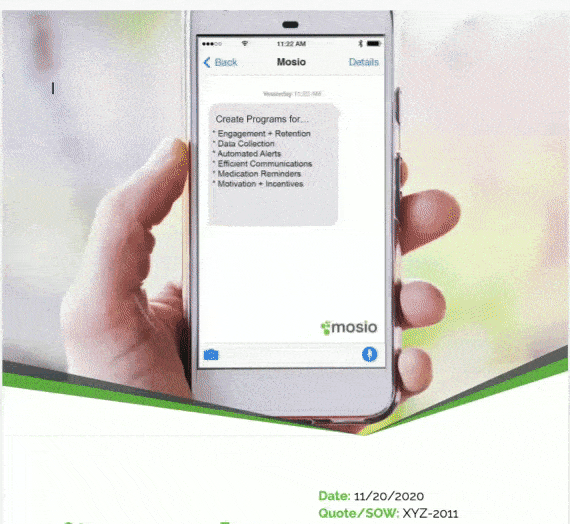Study coordinators have to utilize a range of skills for clinical research.
Running a successful study is no easy task. It can often feel like you are juggling an impossible number of tasks to ensure everything runs smoothly, participants remain engaged, and retention rates stay high.
Ahead of a new study, it’s always good for research coordinators to reflect on how they approach their work and whether they could benefit from switching up their methods. This is particularly important at a time when technology is transforming how research teams interact with participants and manage study workflows.
As a clinical research coordinator, are you:
- Struggling to maintain participant engagement over the course of a lengthy study?
- Finding it challenging to meet compliance requirements while keeping up with day-to-day tasks?
- Looking for ways to streamline communication and data management?
At Mosio, we understand these challenges and know how overwhelming it can be to manage multiple aspects of a study while ensuring high retention rates and participant satisfaction.
We see technology as a powerful ally that enables coordinators to simplify processes, improve communication, and foster stronger relationships with participants.
An effective technology stack should be designed to lighten the workload for research coordinators, allowing them to focus on what matters most: the participants and the integrity of the study. With that in mind, here are 10 essential skills for clinical research coordinators to drive retention and engagement.
10 Important Skills for Clinical Research To Support Retention & Engagement
1 – Effective Communication
Starting with this skill almost sounds cliché, but you cannot underestimate the importance of ensuring that participants feel informed, valued, and motivated to stay involved throughout the study.
From onboarding to study completion, coordinators must ensure that participants understand their responsibilities, the study’s goals, and any updates or changes. Utilizing automated messaging systems can help streamline this process, ensuring timely reminders and check-ins.
2 – Time Management
Balancing multiple responsibilities is a daily challenge for coordinators. Prioritizing tasks, setting realistic deadlines, and using project management tools can help keep studies on track. Task calendars and automated reminders can also reduce the risk of missed deadlines.
3 – Technological Proficiency
Modern clinical research relies heavily on technology. Coordinators need to be proficient in using electronic data capture systems, mobile apps, and other tools designed to enhance study efficiency. A strong grasp of these platforms can improve both data accuracy and participant retention.
4 – Empathy & Interpersonal Skills
Participants are the heart of any clinical study. Coordinators must empathize with their experiences and concerns, fostering a sense of trust and partnership. Active listening and a patient-centered approach can significantly improve engagement and retention.
5 – Problem-Solving
It’s no surprise that it requires quick thinking and proactive solutions to keep studies on track.
Unforeseen issues are inevitable in clinical research. Whether it’s a participant dropping out or a technical glitch, coordinators need to think on their feet to find solutions. Developing contingency plans and staying adaptable can help mitigate disruptions.
6 – Attention To Detail
Compliance with protocols and regulatory requirements is critical. A meticulous approach to documentation and data collection helps ensure the integrity of the study. Double-checking work and maintaining organized records are essential practices.
7 – Cultural Understanding
Studies often involve diverse participant groups. Understanding cultural differences and tailoring communication strategies can improve engagement. Providing materials in multiple languages and being sensitive to cultural nuances can enhance participant satisfaction.
8 – Collaboration
Coordinators work as part of a broader research team. Strong collaboration skills are necessary for effective communication with investigators, sponsors, and other stakeholders. Regular meetings and clear communication channels can foster better teamwork.
9 – Data Analysis
Interpreting participant data and study metrics is key to understanding retention and engagement trends. Coordinators should be comfortable analyzing data to identify potential issues and areas for improvement. Insights from data can guide adjustments to the study protocol or participant outreach strategies.
10 – Adaptability
With new regulations, technologies, and methodologies around every corner, staying informed and open to change ensures that coordinators can adapt to new challenges and opportunities effectively.
Leveraging Technology For Better Study Retention & Engagement
While these skills are essential, leveraging technology can amplify their impact.
For instance:
- Automated messaging keeps participants informed and engaged with timely updates and reminders.
- Data capture tools simplify documentation and ensure accurate record-keeping.
- Mobile apps enhance participant convenience and streamline communication.
At Mosio, we’re committed to helping research teams succeed by providing tools that make clinical research more efficient and participant-friendly. Combining these skills with the right technology, you can create a seamless experience for participants, driving both retention and engagement.





